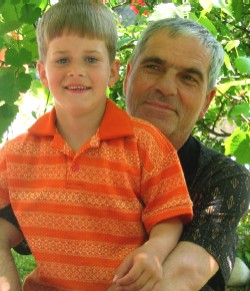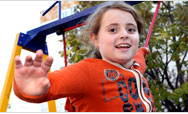You are here » Home » Telling Our Story
Success Story
Alternative forms of care for orphans improves child development
Families Open Their Homes to Orphans

| |
Photo: USAID/Kasey Vannett
|
|
Five-year-old Amel takes a break from bike riding to sit on the lap of his foster father Esef Jusic.
"That boy has made us feel 25 years younger," says Fatima. "He's returned our youth to us."
|
It's the middle of the night and 5-year-old Amel calls frantically for his mother. "Please help me find a place to hide my shoes," he begs. His mother sits on the bed and reminds him that he is no longer in the orphanage where kids take each others' possessions. "You're in your own home now and all your things are safe," she says.
Amel is one of four children who have been placed with foster families thanks to a project USAID is supporting in Bosnia-Herzegovina that works to develop alternative forms of childcare for orphans.
A strong family home offers the best environment for a child to develop emotionally, physically and intellectually. Children who have grown up in institutions, no matter how good, are more likely to develop slowly, to fail educationally and to be ill-prepared for the outside world. Institutions also do not help children become attached to a significant adult, which can have lifelong benefits for their ability to develop trust in others. Social worker Liljana Veselcic says Amel's fears are common. "Every child wants something of his own, so a child without parents becomes very attached to objects such as clothes or toys."
Social worker Fahrija Ganic says that the USAID program has been very successful in her municipality. "They have provided us with an excellent education and positive energy that has helped us enormously." According to Fahrija, one of the most important aspects of her job is finding a good match between foster parents and children. She usually starts by allowing the child to make weekend visits to the foster family, and if they develop a healthy relationship, the placement becomes official.
In Amel's case, there is no doubt that his placement with Fatima Jusic, 48, and her husband Esef, 56, has been very successful. Fatima says Amel bonded with Esef immediately. "Wherever his father is sitting, Amel is either in his lap or leaning on his arm," she says.
"When Amel arrived here two months ago, he was very shy and withdrawn. But just look at him now," says Ganic as Amel flew by on his bicycle with several neighborhood children.
"That boy has made us feel 25 years younger," says Fatima. "He's returned our youth to us."
Print-friendly version of this page (244kb - PDF)
Click here for high-res photo
Back to Top ^ | 

